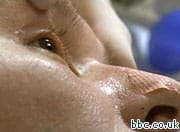People who are almost completely paralysed could soon be able to drive an electric wheelchair, type messages to their loved ones and surf the web, thanks to new research by Israeli scientists.
The research is likely to bring fresh hope to those affected by ‘locked-in syndrome’, a condition which locks an intact mind into a paralysed body.
Scientists, from the Weizmann Institute of Science in Rehovot, are testing a “sniff detector” which monitors air flow through the patient’s nose.
Signals
This device, which has been tested on three patients suffering from ‘locked-in syndrome’, picks up pressure changes in the patient’s nasal cavity, and converts these into electrical signals which can be used for a variety of purposes.
One of the patients was a 51-year-old woman, who has been unable to move, blink or speak after a stroke, used the device to write a message to her family.
She was able to write the message after practising for 20 minutes a day for just under three weeks.
Write
And another patient, who has been in a ‘locked-in’ state for 18 years, was able to write his own name within 20 minutes of using the device.
Eleven other quadriplegic patients were able to use the device to drive an electric wheelchair and browse the internet.
Dr Noam Sobel, a neurobiologist at the Weizmann Institute said: “The most moving thing has been witnessing this technology give people a means of communication when they haven’t had it”.
Live
And while he feared that the patients may communicate a wish to die after being isolated for so long, no one did.
However, some scientists have expressed doubts about the technology which is still under development.
Earlier this month it was revealed that a father-of-two, who suffered from ‘locked-in syndrome’, was about to have his life support machine turned off when he signalled to doctors that he wanted to live by using eye movements.
Changed
The family of motorcycle enthusiast, Richard Rudd, had decided to switch off the machine based on comments he had made in the past.
Speculating on what he would do if he were ever paralysed by a motorcycling accident, Mr Rudd had previously said he wouldn’t want to live.
But doctors realised Mr Rudd had changed his mind when they discovered he was able to move his eyes in response to questions.
And last week Tony Nicklinson, who also suffers from ‘locked-in syndrome’, began a legal challenge to force the Director of Public Prosecutions to issue guidance clarifying whether his wife would be prosecuted for murder if she kills him.


